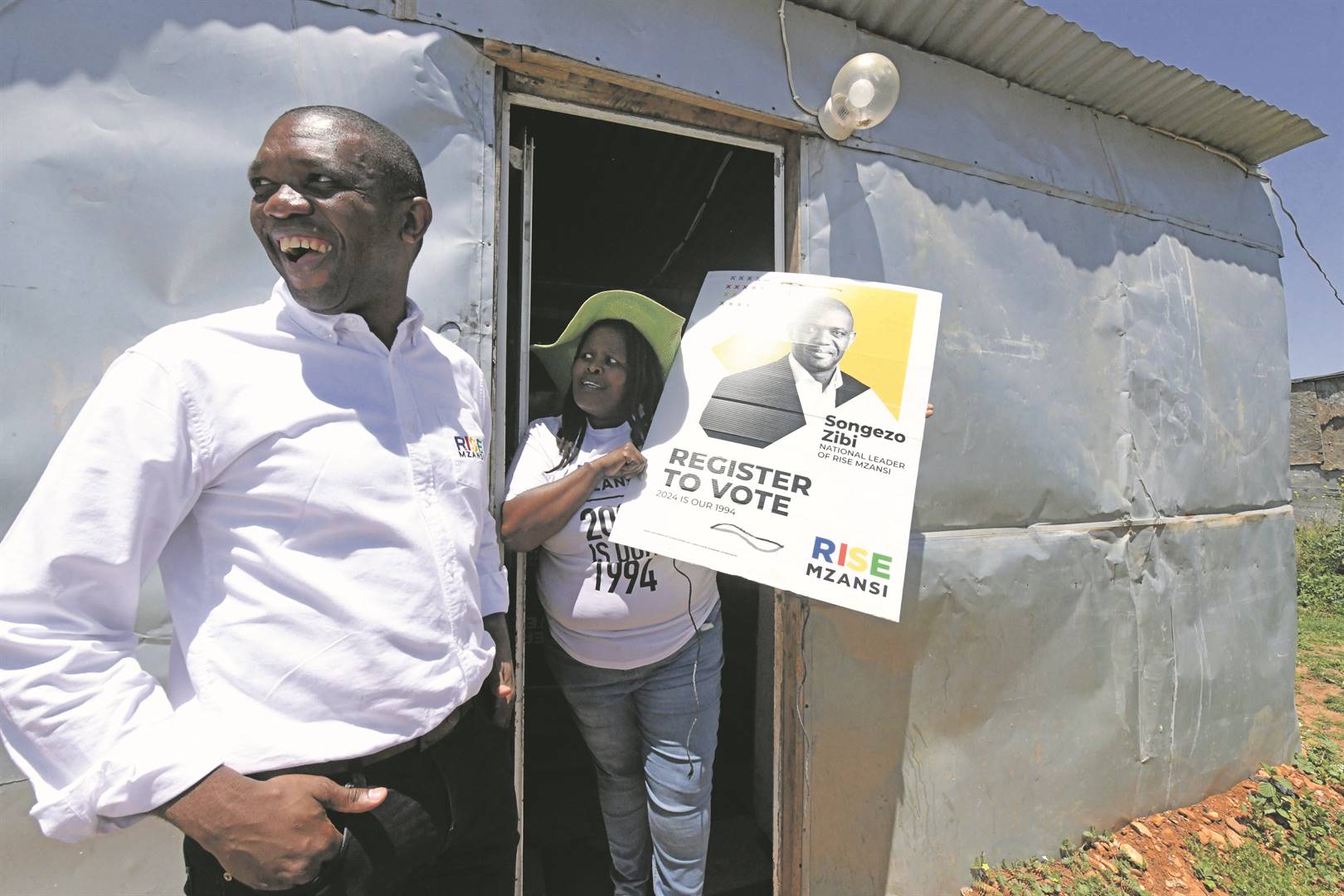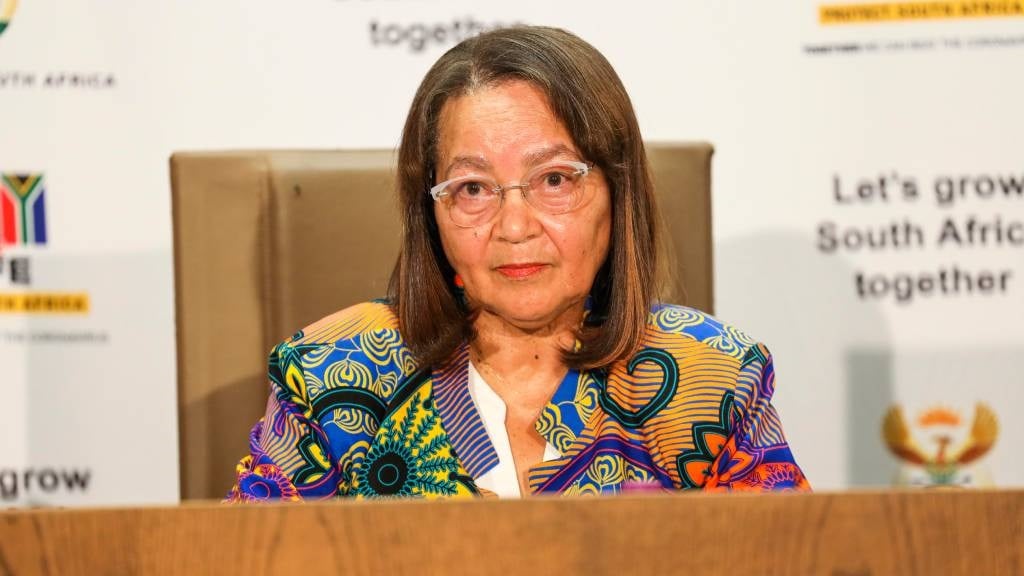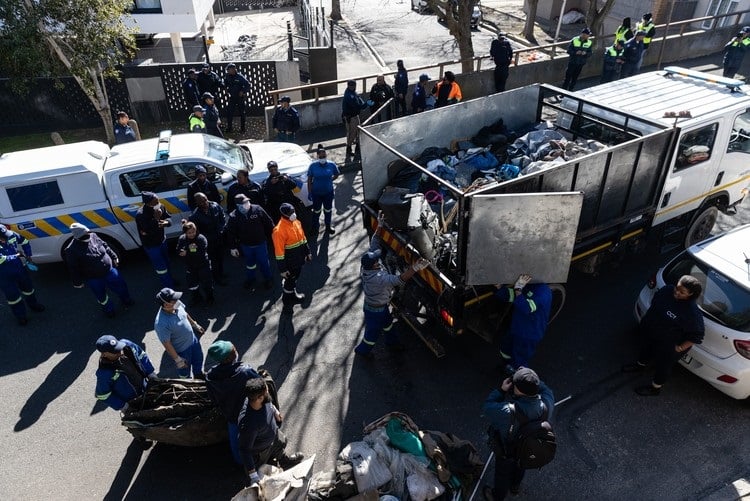
The leader of Rise Mzansi, Songezo Zibi, embarks on a door-to-door voter registration campaign in Motherwell on 9 November in Gqeberha, Eastern Cape. South Africa will hold general elections this year to elect a new National Assembly and the provincial legislature in each province
New kid on the political block Rise Mzansi has unveiled its manifesto ahead of the national election, vowing to end hunger and ensure there is affordable, nutritious food for poor South Africans.
Outlining the declaration at the Heartfelt Arena in Pretoria yesterday, the party’s leader, Songezo Zibi, outlined its battle plan and vision, should it win the election and govern the country.
He said the People’s Manifesto was a culmination of listening, consultation, community meetings, policy gatherings and the People’s Convention.
READ: DA Gauteng MPL Khume Ramulifho quits to join Rise Mzansi
Rise Mzansi’s manifesto seems to address many problems which South African citizens are complaining about. Zibi spoke about crime, hunger, load shedding, water shortages, job opportunities and investment, among other issues.
“Given the prevalence of food insecurity and hunger, a Rise Mzansi government will use a combination of state income grants and food discount vouchers for grant recipients, increasing access to piped water in rural areas, land for own-food production and small-scale farming to improve food security.”
According to him, these interventions will be sufficient to eliminate hunger, malnutrition and the resultant growth stunting.
A THEMED PLAN
He announced five themes his party would prioritise if it took the reins in government.
Under the first theme, titled Leadership, governance and implementation, Zibi said the party would appoint capable, ethical leaders in government to ensure that excellence became the norm.
“We’ll end cadre deployment so that people in positions of public responsibility are highly skilled, capable and ethical. We’ll take further reform actions to ensure efficient delivery of government services.”
He also promised to reform and downsize the Cabinet.
Zibi said:
The size of the Cabinet has increased as the ANC’s run out of ideas and relied on setting up a ministry for every crisis it’s created, such as a ministry for small business and electricity. We’ll redesign the Cabinet, streamline its functions and reduce its size. Ministers will be compelled to report to relevant Parliament committees on a quarterly basis.
He said that the bullying behaviour of the “blue light brigade” would also be stopped. “Police convoys which command the right of way on our roads should be reserved for the president, the deputy president and visiting heads of state,” he said.
READ: Editorial | Politics is a numbers game, but moustaches can apparently make or break you
Under the fourth priority theme, Zibi’s party identified issues that required urgent attention, including malnutrition, drug abuse, mental illness, violent crime and corruption.
He said:
We’ll prioritise efficient regulation of alcohol sales within communities and proactive preventive policing in well-known violent crime nodes. We’ll refer substance abuse victims to counselling and rehabilitation centres, while prioritising the detection and prosecution of drug traffickers and distributors.
Regarding land distribution, he said his party would reorientate spatial planning to take account of the rate and nature of urbanisation. It would accelerate land distribution, using lawful expropriation of such land, when necessary.
“New city and rural planning will provide for a mix of government housing and serviced stands for those who can afford to build. We’ll also provide for ‘green zones’ that include stock and crop farming for own and commercial food production.
“In this regime, every stand, rural or urban, will have piped water to enable sanitation and food production. This planning will take account of transport infrastructure needs, which are often ignored, especially in rural areas,” said Zibi.
He said that Transnet and Eskom were the two biggest constraints to economic activity, while water infrastructure was a close third.
Zibi explained:
We’ll ensure that both entities have boards and management with the requisite experience and expertise in turning around large industrial companies in crisis. Their installation will be accompanied by public and private capital injection within a clear framework of national legislation and rules of governance to protect public interests.
He added that Rise Mzansi would also reduce pressure on the grid and create new economic opportunities.
The party, he said, would use international climate change transition financial instruments to develop a local solar production and installation industry, helping households and small to medium-sized businesses to reduce their reliance on fossil fuels.
“The majority of existing households and businesses will be powered in this way within five years. We’ll invest in the repair of major water and flood management infrastructure, and the development of new infrastructure to basic service delivery, and enable new commercial investments in major industries,” said Zibi.






Recent Comments